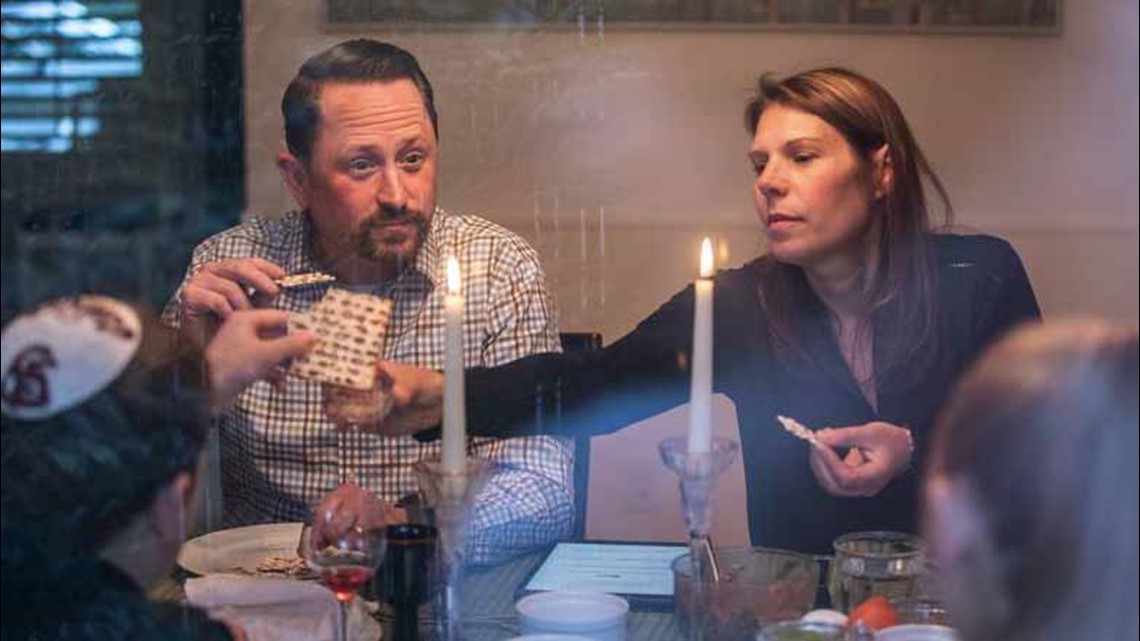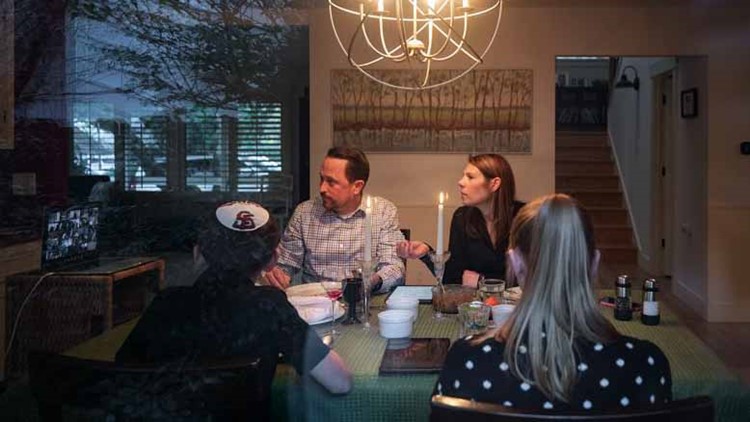LAKE OSWEGO, Ore. — Passover Seder for Gabrielle Williams usually entails several days of shopping and cooking to entertain 20 people in her home.
The multi-part religious ceremony and symbolic meal that kicks off Passover, when Jews celebrate their ancestors' salvation from slavery, is one of the most social holidays of the year.
Not this year. Her family is confined to their home like 95 percent of the U.S. population, by the coronavirus pandemic.
A first night of Passover Seder is usually a domestic, friends-and-family affair. The second night Seder is often a community celebration, with a catered meal in a banquet hall. And in 2020, Williams, her husband David, their high school senior Matigan and 13-year-old son Tate, did both. Zoom-style.
Wednesday and Thursday they laid the table, took their places then turned to the laptop for inspiration.
Wednesday's first-night Seder was organized by a friend's brother-in-law in San Francisco. "There were 28 screens with almost 60 people from all over the United States, and it was a really well-planned," Williams told the Portland Tribune. "It took him a week to organize. We received emails every couple days. Everyone had special sections (of the Haggadah, the prayer book of the Seder) they were reading, and then we had breakout groups for actually eating dinner."
The oldest person to take part was 104, and it ranged down to college students and school kids. Williams said she was pleased to have her mom join in from Southern California. Their daughter, Matigan, has been sad lately about the end of her senior year at Lakeridge High being converted to e-learning. She is missing out on clubs, student government and prom. But she was happy to find two girls she knew from California and was able to chat with them like they were in the same room.
April 2020: America on mute
For Thursday's second-night Seder, Williams's rabbi, Alan Berg of Temple Beit Haverim in Lake Oswego, led the prayers from his home. The cantor, Ann Brown, sang from her home, and a member of the board acted as live producer, unmuting people when it was their turn to read or pray. Forty households joined in, or two pages of thumbnails of faces from Lake Oswego.
They had the Haggadah on two iPads so the family could follow along. They also texted friends during the service, something Williams never would have done in a synagogue.


"It's the most-observed Jewish holiday, meaning many people who live very modestly religious Jewish lives will observe Passover," Berg told the Tribune. "Passover is very important to people. It's casual. It's about political freedom, about the Hebrews going from slavery to freedom. It's easily understood and has a very special meaning, and out of that comes a lot of family memories."
Gabrielle Williams continued, "One of the surprising things is, when you do it from your home and you're just with your family, it's so much more casual." Usually it's a dressy affair, a big occasion in someone's home and great care is taken with the potluck style meal.
"But when you're sitting in your own home, and everybody's on the computer or a phone or whatever, it's so much more casual. And people are trying to figure out the technology. There were a couple people who had said they had never used Zoom before."
This too shall pass
All the Williams family use it for work and school. Necessity is the mother of invention, and the disembodied faces and voices are becoming natural.
The rabbi's face was a small image like everyone else's. In the end, after the final chant "Next Year in Jerusalem" and the fourth glass of wine, people were unmuted for a few minutes to wish each other well. And then it was over.
"The gentlemen who organized last night (Wednesday), he made a nice statement around the song 'Dayenu' (Hebrew for "It Would Have Been Enough"). He said, just about whatever you do this year is enough, because of the situation. If you don't have the proper food, that's okay, this is enough."
Afterwards, Williams said it was a spiritual experience, considering "the situation." These have been her temple people for 17 years.
"It was a really a very special way to have Passover, the best it could possibly be without actually, physically being there with other people," Williams said. "The community is what makes it all so very special. On Tuesday, my son and I spent all day cooking for Passover. That was a whole day I wasn't thinking about everything else that is going on. That was really nice."
Who's Zooming who?
Zoom is the video conferencing software that has passed from the office to the home, leapfrogging Facetime, WhatsApp and Skype with its ability to deliver in-focus, smooth-moving pictures, arrayed in a gallery of thumbnails, with good sound.
"I find that Zoom has more feeling of being connected visually than Facetime, it's a little more precise, that picture," said Rabbi Alan Blum of Temple Beit Haverim in Lake Oswego. He already streams services online. This year he did a whole virtual, second-night Seder for his congregation.
"Meetings" up to 40 minutes are free, and there are other cool features, like background blur and breakouts where subgroups can form for more intimate discussions. For the Williams family, the breakouts were a perfect time for eating the Seder meal and talking among friends.
This article was originally published by the Pamplin Media Group, one of more than a dozen news organizations throughout the state sharing their coverage of the novel coronavirus outbreak to help inform Oregonians about this evolving health issue.



